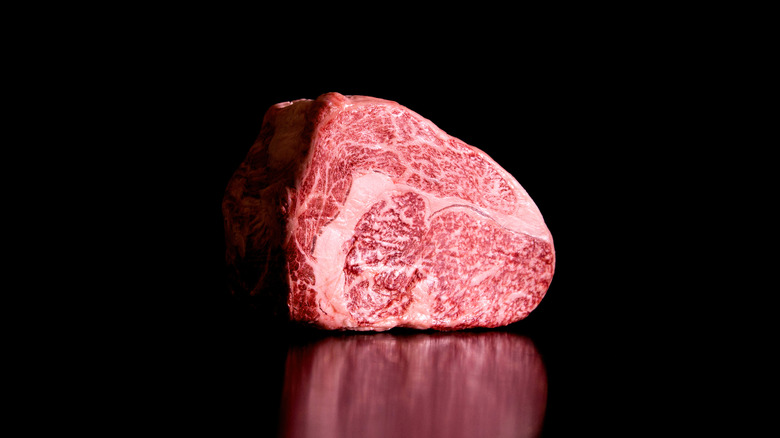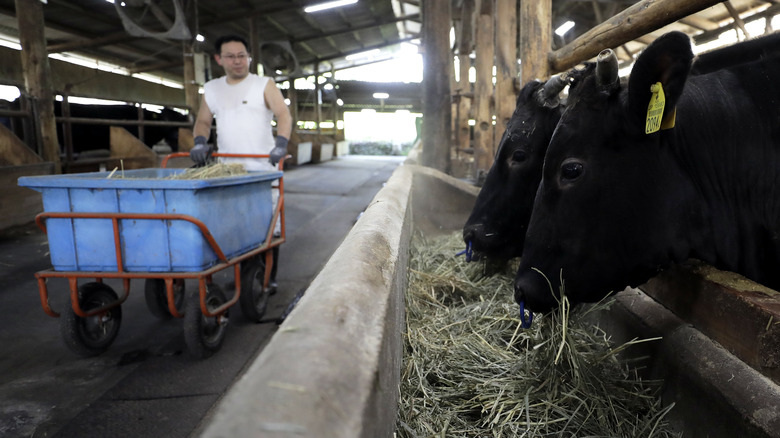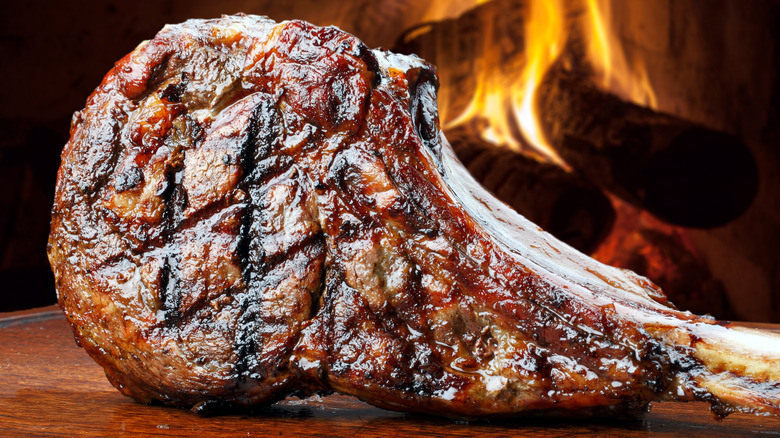The Reason Wagyu Beef Is So Expensive
Wagyu beef — has any one ingredient elicited more hype, more praise, and more salivating mouths? It's become the biggest buzzword in the culinary field, and a significant part of that reputation lies in the astronomic prices this Japanese cattle breed commands. Business Insider reports that a single pound of Wagyu beef can cost as much as $200, and if butchers want the entire cow, they'll have to fork over some $30,000. With so much money on the line, it's natural to wonder, is Wagyu beef worth it or is it merely a hype train running rampant through the restaurant scene? Honestly, how different could it be from other breeds of beef?
Very different, it turns out. Wagyu, which literally means "Japanese cow," is produced in a wholly unique way. The cattle, which must belong to one of four breeds exclusive to Japan, are raised on a particular diet that aims to maximize intramuscular fat in the meat, widely known in the culinary world as "marbling." When you cook a steak on high heat, that fat melts, infusing the muscle with rich, beefy flavor and bestowing a supremely tender, juicy texture upon the cut. You can feel it start to melt in your mouth as soon as it hits your tongue, and the intense taste will transcend any piece of beef you've ever tried before. Here's the secret to wagyu's quality and cost.
How wagyu cattle are bred and raised
There are only four breeds of cattle that classify as wagyu. They are the Japanese Black cow (Kuroge Washu), Japanese Brown cow (Akage Washu), Japanese Polled cow (Mukaku Washu), and Japanese Shorthorn cow (Nihon Tanaku Washu). All four of these breeds are exclusively raised in Japan, although each one of them hails from a different part of the country. The most common type of wagyu is the Japanese Black. Of particular note is the Tajima line of this breed, raised only in Hyōgo prefecture, and known as the source of the world-famous Kobe beef.
Wagyu cattle are raised in a very particular way that aims to maximize their body fat, which can reach as high as 50%, and their diet often consists of hay, grain, and wheat. Wagyu cattle are fed for longer periods than American cattle are, and the limited amount of land available in Japan means that smaller herds are raised. These factors combine to drive the production cost of each cow much higher than the average head of American angus.
Since wagyu cattle are so prized, there are a number of measures in place to prevent fraud. Each wagyu cow born in Japan is assigned a tracker number that retailers can use to verify its place of birth and lineage. These extra measures only increase the already substantial price of wagyu beef.
Japanese wagyu vs. American wagyu
Today, you can find Japanese wagyu at major American retailers like Costco and Walmart, where they typically run from $100-$200 per pound. In 2003, Japan and many other countries banned the importing of live cattle to America following the discovery of BSE, better known as "mad cow disease." Thus, there have been no purebred wagyu cattle alive in the United States for years.
Japanese wagyu cattle were exported to the U.S. a few times before the ban, however, and efforts to crossbreed these cows with American breeds have produced what is known as "American wagyu." It is sometimes known as "wangus beef" due to the fact that many Japanese cows were crossbred with American angus cattle, and while it does not meet the same quality standards established in Japan, it is still a high-quality option, more widely-available at American stores, and generally not as expensive as the pure Japanese product.
Finding Kobe beef specifically is harder. According to the Kobe Beef Restaurant Guide, only 38 retailers in the U.S. are licensed to sell real Kobe beef. Unfortunately, there are a number of businesses that falsely claim to sell Kobe beef as a marketing ploy. Authenticity matters with this much money on the line, so it's probably safest to look for wagyu in general, unless you can verify that a Kobe retailer is authentic.


